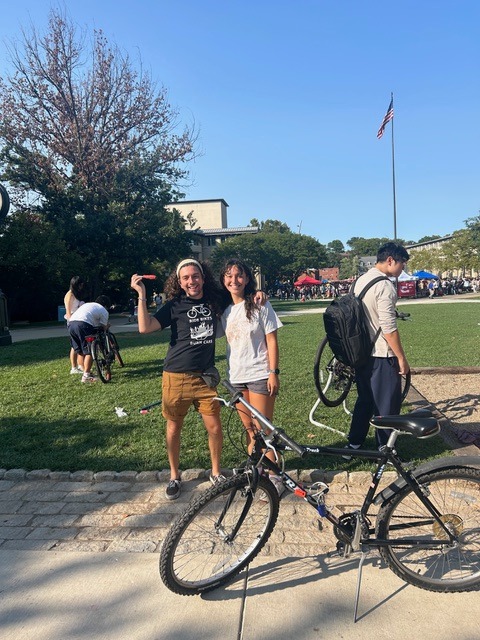America Walks is proud to uplift and support youth-led efforts like this that expand mobility options for all. As part of this work, we are proud to collaborate with the National Youth Bike Council to spotlight and strengthen youth-led mobility initiatives across the country.
The Tartan Bike Project is a powerful example of freedom to move in action. By building community through bicycles, Kenedy and Hosea are not just meeting a transportation need, they’re reshaping the culture around their campus to center access, social connection, and collaboration. For years, community-led solutions have played a critical role in filling gaps and advancing transportation solutions. Their efforts show how mobility can be reimagined through youth leadership. Together, we will continue to ensure that young people not only have access to transportation but a powerful role in shaping its future.
By Joshua F. and Ruth Rosas
It’s called the Tartan Bike Project.
What’s top of mind for college students these days? Freedom to move, affordable transportation, and finding real, meaningful friendships. That’s the spirit behind the Tartan Bike Project, launched by two graduate students, Kenedy and Hosea, who together raised $20,000 toward an on campus ‘Bicycle Project’.
Naturally, we were curious—how did they pull that off? In short, it took a lot of planning.
Since last year, the pair have been moving on launching a bicycle repair & rental space on campus in their free time. Its goal? To create a welcoming space where Carnegie students can gather around bikes, get repairs, borrow a ride, and keep campus life active and mobile—especially in the warmer months.

We Interviewed Kenedy
“Moving to a new city was difficult,” Kenedy shared. “OBP was a big part of my community, so I wanted something similar in Pittsburgh.”
She’s talking about the Orange Bike Project at the University of Texas (UT) in Austin, where she did her undergrad. It was a student-run campus bike program that offered not just tools and repairs—but community. That experience sparked the inspiration behind the Tartan Bike Project.
When Kenedy started college at UT, she got a bike. Then she saw a call for volunteer mechanics at the Orange Bike Project. That was her entry point—not just into fixing bikes, but into a unique kind of student environment with a shared vibe and purpose. The bike shop became her second home.
After moving to Pittsburgh and meeting Hosea, Kenedy found herself in familiar territory—needing to fix her bike. On top of the need to fix it, she was getting ready to invest in a better and higher-end bicycle. The gap of there being no on-campus bicycle spaces got the pair thinking, maybe they were not the only ones with this issue.
After about a semester of listening and getting used to Pittsburgh, they figured out they were right. They were not alone in their needs. The hesitation amongst their peers to invest money or time to learn about bicycles mostly stemmed from a lack of repair support on campus. That growing need, mixed with their own desire for a shared student space, gave a new meaning to something bigger: the Tartan Bike Project.
Getting $20,000
The first part of the journey to starting a Bike Project was not straightforward but they had an idea: a pop-up bicycle stand. Hosea and Kenedy printed a ton of posters and hung them up around the bicycle racks on campus, drawing in over 80 students to their one-day pop up bicycle stand. To make sure it was not a fleeting idea, the two prepared a survey which about 40-50 students filled out, where they asked for volunteers, opinions and needs.
This initiative was so successful that the pair were invited to table at Bike Week which came up a few months after the pop up table. This initiative was run by Transportation Services at Carnegie, led by Michele Porter, the department’s Director. This event offered bicycles that were left around campus to passing students alongside a lot of other amenities from off-campus bicycle providers. The main issue the two noticed was that the bicycles that were given away would end up abandoned again because students had no clue on how to fix up the bicycles. With the help of Kraynick’s Bike Shop, who provided them the tools, the opportunity turned into another promising success, where they fixed as many bicycles as they could that day, building their case for why an on-campus bicycle project was needed.
They worked closely with the school and some friends from Pitt Bike Cave to curate a proposal that went through the Graduate Student Assembly. Simultaneously, they made sure to make friends along the way with Michelle Porter.
Reflecting back, Kenedy mentioned that her role models for starting the Bike Project were more
than just the Orange Bike Project students, but Yellow Bike (also located in Austin), Pitt Bike Cave (located in Pittsburgh), and FreeRide. Each organization’s presence in her communities helped make an impact on Kenedy’s decision that an on campus Bike Project would be worth it.
The proposal was approved by the Graduate Student Assembly which got them a multi-year commitment to support the Tartan Bike Project with $20,000. (Later, the Graduate Student Assembly would approve another 3K of additional funding to support other more immediate project needs.)
We Need More Of This
Kenedy left us with one piece of advice: “Connect with people around you.” This advice is a message specifically to students who may be considering starting a bicycle project at their university.
Hosea and Kenedy know their project is long lasting as support in their work from Carnegie demonstrates the university’s multi-year financial commitment to student transportation needs and fostering on-campus student relationships. Their current challenges are now putting into action all the needs they mentioned in the budget. The two have big plans and wishes, all the way from offering credited classes with the Tartan Bike Project to being a part of the school’s Transportation Service department.
Tartan Bike Project will be open Fall 2025, starting with a few regular hours, and some social aspects.
Do It Yourself
Hosea and Kenedy are not the only ones with on-campus bicycle projects. There are other long-standing bicycle projects that have figured out what makes a university bicycle project work.
Tatiana from Georgia Tech, is the former president of Starter Bikes, a bicycle project very similar to Tartan Bike Project, at a Bicycle Friendly University has agreed to give us the ‘Essentials to start a College Bicycle Program’ on July 14th at 11:30 AM ET. During the webinar, Tatiana, will break down the essential resources you need to start or sustain a bike program on your campus. From sourcing tools and parts to securing space and allies, she’ll share practical tips and lessons learned from running a thriving student-led bike shop at Georgia Tech.

Sign up for our Youth-Bike Hub Newsletter to join the webinar.